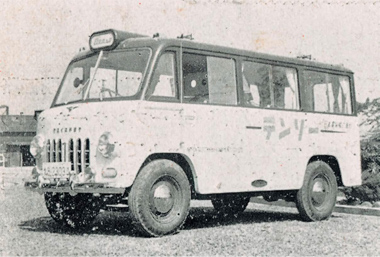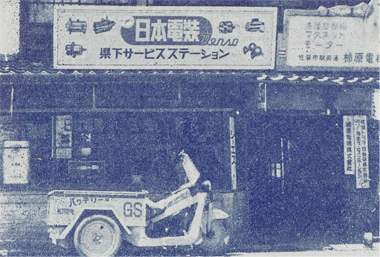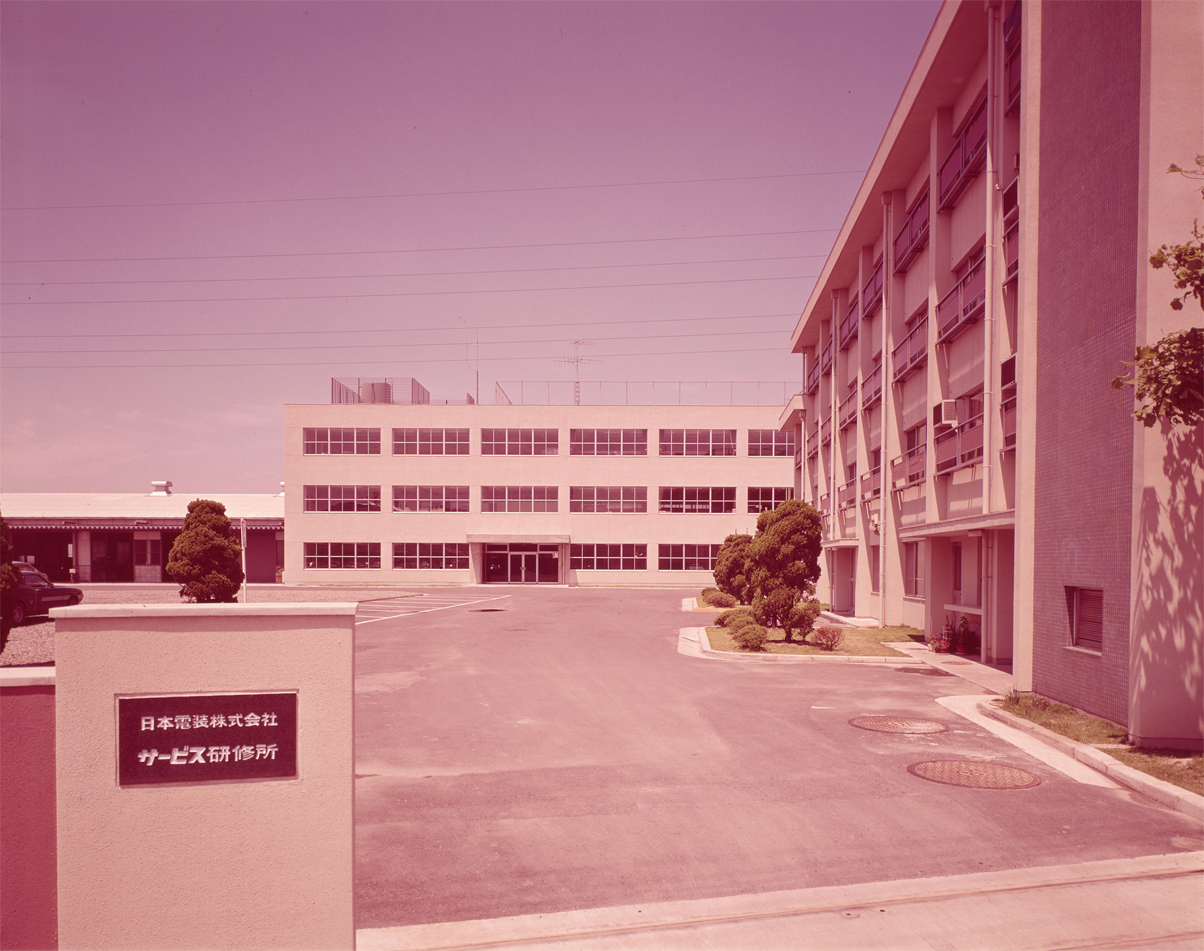Working from the perspective of realizing "high quality service activities," our company has developed activities with systems and measures constructed with the aim of being the top company for customer service, and has continued activities to support sales expansion based on one of the best service systems in Japan.
Since its founding, one of the management policies of the company has been to satisfy customers by providing attractive products in line with their requirements. Furthermore, after entering into the technical cooperation with Robert Bosch GmbH in 1953 and witnessing the excellence of the Robert Bosch service system, Nippondenso fully recognized the importance of service and went on to establish the basic philosophy that "products become commodities when service is added to them."
Ever since then, the company has worked based on this basic philosophy and developed service activities with the following three pillars.
The contents of activities can be divided into two areas, which are the "activities to provide high-quality services" and the "activities to produce high-quality DENSO products." The "activities to provide high-quality services" include establishing service bases, developing service technology and equipment, publishing documents, and conducting training. They also include the setting of warranty rules. The "activities to produce high-quality DENSO products" include collecting market quality information and promoting product improvement. In addition, in recent years, the field of activities has also expanded to include service activities related to environmental protection.
| 1952 |
- Nov
-
First issue of the DENSO Monthly Report (the predecessor of the "DENSO GIHO" (technical report))
|
| 1953 |
- Jul
-
Completed the "DENSO Service Car". Started service on tours accompanying Toyota Motor Sales
The initial role of the service was to work in conjunction with the traveling service of Toyota Motor Sales to repair defects directly at car dealerships nationwide. This service was welcomed everywhere it went and in addition to helping eliminate customer dissatisfaction, it also helped gain customer confidence in Nippondenso products. These activities led to the formation of the basic philosophy for service that, "it is only when service is added to a product that the commodity value of being able to use a product with peace of mind is created."
|
| 1954 |
- Aug
-
Start of the system of DENSO designated service stations (hereinafter called "SS")
The company started establishing a network of designated SS as part of the DENSO after-sales service network, and this was the start for an after-sales service system consisting of 24 service dealers. By the time of the first general meeting of the service dealers in 1955, the number had expanded to 41 dealers. In the same year, the company also began providing training courses and publishing technical materials for the service dealers, thereby developing functions to strengthen the service network.
|
| 1955 |
- Sep
-
Held first SS general meeting (41 companies)
- Oct
-
Held first SS training course
The first SS training course was held in 1955 for the purpose of car heater servicing. The company also began service technology education and document issues to strengthen the service network, such as with the issuing of the "DENSO Technique."
|
| 1956 |
-
Developed and launched electrical equipment and injection pump test benches
Nippondenso developed and produced test benches for electrical equipment and fuel injection pumps and put them on sale. It also began to develop and provide testers, which are a specialized tool necessary for repairs at SS, so the basic functions that support the service activities of today had been largely put in place.
|
| 1963 |
-
Started the system of DENSO special service agents (hereinafter called "SSS")
|
| 1970 |
- Mar
-
Supported bus coolers at Osaka Expo
|
| 1971 |
- Apr
-
Held the first SS/SSS maintenance skills competition (electrical equipment)
|
| 1973 |
- Jun
-
Completed a service training center
|
| 1974 |
- Apr
-
Held the first pump SS maintenance skills competition
|
| 1976 |
-
Started building an injection pump service network overseas
The development of an overseas service network began in around 1976 with the establishment of a car-cooler service network in Southeast Asia. Later, the company was requested to set up a service network when it delivered injection pumps to the U.S. company John Deere, so a service network was also developed in earnest in the U.S. from 1977 onward. The next step was the establishment of an injection pump service network in Canada, and later, as the trend toward diesel use continued, an injection pump service network was set up worldwide.
|
| 1978 |
- Apr
-
Started the system of authorized service stores for electronic fuel injection
A representative product for car electronics is the electronically controlled fuel injection equipment (EFI: Electric Fuel Injection) that was introduced in 1971. This was a time when the introduction of the world's most stringent emission regulations was accelerating the use of electronics, particularly for engine control.
In response to the increased use of car electronics, Nippondenso promoted measures to strengthen the technical capabilities of the service dealers, such as by starting car electronics education at the service training center. Furthermore, in 1978, a system to authorize stores to perform electronic fuel injection service was introduced and a system of service personnel qualification was established to improve the technical level of the service dealers.
|
| 1981 |
-
Started the system of cooperating radiator service stores
|
| 1982 |
- Nov
-
Started the system of MARU-E (electronic product internal repair) service dealers
|
| 1987 |
-
Established a manufacturing company for rebuilt products (AMERICAN INDUSTRIAL MANUFACTURING SERVICES, INC.) in the U.S.
|
| 1989 |
-
Launched a freon gas (R-12) recovery machine
|
| 1995 |
-
Started a system of actual vehicle monitor tests overseas (Canada)
-
Established an element replacement and repair center for electronic products (MARU-ESC system)
Further technological innovation led to multilayered substrates and more integrated and compact integrated circuits (ICs). In order to respond to this, DENSO strengthened its electronics repair system by introducing sophisticated inspection benches and by opening two centralized repair centers for electronic system products (MARU-ESC). These centers in Yamagata and Nagoya were provided with high-precision repair technology.
The establishment of the MARU-E service dealer repair system also led to a great change from the structure of the service network up to that point. In the previous policy, all DENSO service dealers were expected to carry out the same functions individually and uniformly. However, with the MARU-E service dealer repair system, the new way of thinking introduced was that other service dealers could utilize the 64 MARU-E service dealers nationwide, so that this would make it possible to demonstrate a constant level of service as a service network. This way of thinking was later also adopted for various products. In particular, for the repair of products manufactured in small amounts and those requiring large investments, the company created a system of cooperation between the centralized repair centers, assorted goods center stores and other service dealers.
|
| 1998 |
-
First issue of "Service Tech" for overseas (overseas version of the "DENSO GIHO")
|
| 1999 |
-
Started repairs of CRS pumps (HPO) in Japan
|
| 2000 |
- Apr
-
First global service meeting held
The company began building the foundations for a global service system and this meeting was attended by the people responsible for service at major bases around the world. Through these discussions, the world was divided into four regions (North America, Europe, Asia-Oceania, and China), and the system formulated included regional management that could cooperate globally (headquarters - core bases - sales/bases responsible for markets). There were also rules established for the consignment of work between bases and rules established for service system planning. Later, in 2002, the "Global Service Outline" was published to share the thinking, role and activity details of the global service system widely with all concerned parties, including the service staff in Japan and overseas.
-
Started the development of an overseas warranty claim information management system
-
Started repairs of CRS pumps (HP2) in Europe
|
| 2005 |
-
Operated a special service system for fuel cell bus coolers at the Aichi Expo
|
| 2012 |
- Apr
-
Started service spirit training
|
| 2013 |
- Jul
-
Opened PIT&GO stores in Cambodia and Myanmar
A new car maintenance network called "PIT&GO" was developed in the Asian market under the instruction of DENSO. This was the development of stores that went beyond the conventional framework of just repairing items such as air conditioners and injection pumps. The aim was to perform vehicle maintenance that would solve the problems for cars overall and contribute to sales expansion. Based on the experience in Asia, DENSO is also now expanding this into the African market.
|
| 2018 |
- 12月
-
Started HV battery repairs in Mongolia
|


